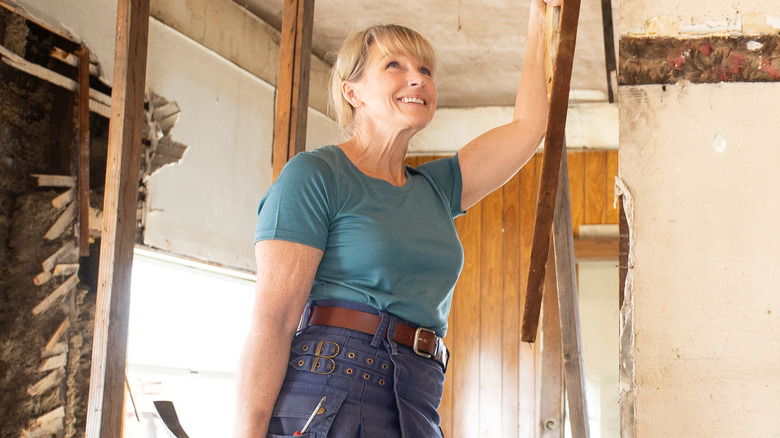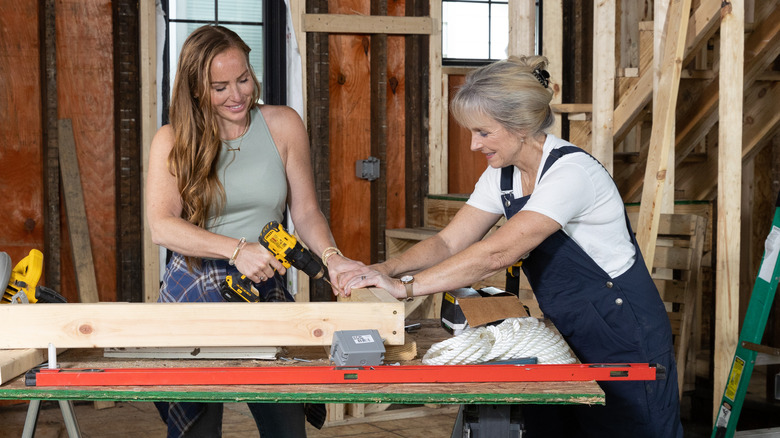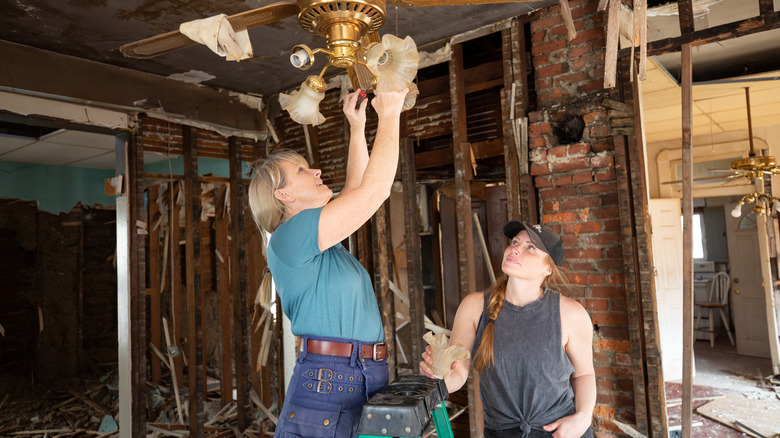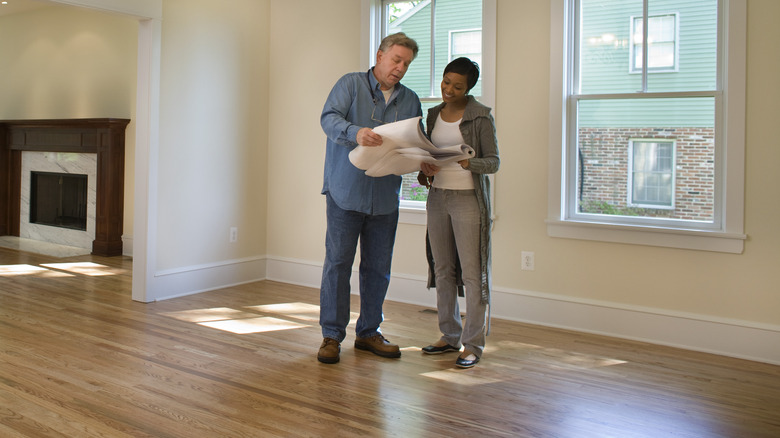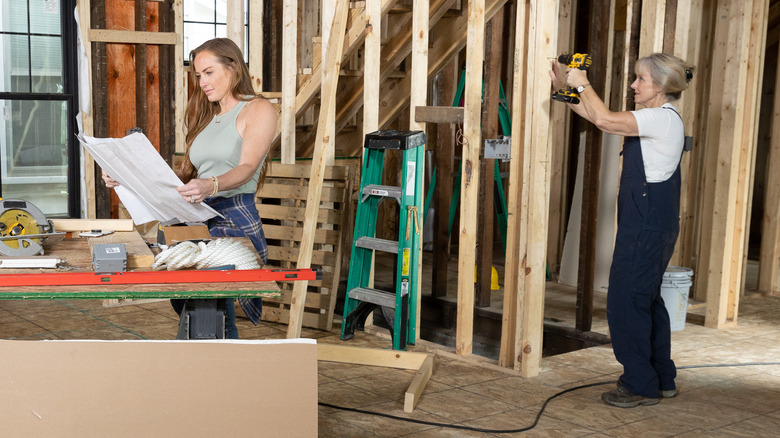HGTV's Karen E Laine's Essential Tips For Your Own Good Bones Treatment - Exclusive Interview
America is filled with run-down houses that appear well past their glory days. While any flipper can apply a coat of paint and add a couple of trendy features to sell a house for a profit, the down-to-the-studs renovations that Karen E Laine oversees on HGTV's "Good Bones" is clearly done with more than profit in mind. Along with her daughter, Mina Starsiak Hawk, the "retired" lawyer-turned-renovator is more interested in revitalizing Indianapolis neighborhoods to their former glory, one property at a time — even if she is forced to get up close and personal with human waste or handle the occasional rat carcass.
In an exclusive interview with House Digest, Karen dished on what will be the final season of "Good Bones" and provided a detailed run-down of her relaxing post-retirement life after stepping away from Two Chicks and a Hammer (just kidding; it sounds like she's as busy as ever). The self-taught property surgeon also offered plenty of tips for homeowners who are renovating fixer-uppers, wishing to upgrade their home's curb appeal, and seeking to transcend their property's flaws through interior design.
What to expect for Season 8 of Good Bones
After seven seasons of "Good Bones" and plenty of critical acclaim, how are you, Mina, and the crew changing things up for a much-anticipated Season 8?
Maybe we decided to get worse at what we do [rather] than better at what we do. I'm not sure. There were so many challenges in Season 8 — contractor challenges. I had bigger craft challenges, which are the smallest challenges in the world, but things went terribly wrong. That's not really changing it up though, is it?
We always have challenges. We try to figure out how to meet them. There is an income-producing property. That's a change. I don't think we usually have income-producing properties where you buy the house, you live in the house, but there's an income-producing area.
You see a lot more that Tad, especially, is more on his own, with his own company, doing his own thing. He built his own house and we helped him out. That's a change. My youngest daughter, Kelsey, made a change and moved from the house that Two Chicks built, to her — I'm thinking — forever home that Two Chicks helped her remodel, and reimagine, and made everything she wanted it to be.
You've seen your fair share of wild renovations over the years. Are there any specific properties you tackle in the new season that offered a new challenge?
[There are two] that we tackled, beginning at the beginning of Season 7, and could not finish them. They are actually airing for Season 8, but it seems like there was a very long time horizon on a number of properties. Because I'm not part of the company anymore, I'm not part of who we hire or regularly checking on the properties. I wish I could tell you what the problem was that made these take so stinking long. It's crazy.
An eventful retirement
Having retired from the business you co-founded with Mina in 2019, what have you been doing to keep yourself busy these days? Have you taken on any recent personal projects?
"Retired" is such a cute word when it's applied to me because people look very confused. They say all the time, "But you're retired." Well, retired looks different to different people. Since I was "retired," I bought a retirement home in Wilmington, North Carolina. I have wanted to retire to that specific town for a long time. I took a trip in January. I walked the whole historic part of the city. The city's pretty big. You can't walk the whole thing.
I found a house on Zillow, bought it, and since January, have been trying to find a contractor who will rehab it. I finally found one in June. I've been spending about half my days in Wilmington working on my little house. It is a classic "Good Bones" house. It is a gift that keeps on giving. If I'm not there, I get a call every day from my contractor telling me the new thing he found wrong, and then I say, "Okay, coming down. I'll be there. Hang on a minute."
There's a lot more time with grandkids. Grandkids who used to live in San Francisco now live in Indianapolis, so it's way easier to see them, which is, as a grandmother, in my opinion, it's the best thing in the world to have your grandkids close enough. We would have a call every week, but having them here in Indy, it's my heart. I love them.
I filled in my koi pond, so that's been keeping me busy because I didn't get any help. If somebody can do the math out there, it was about 50 cubic yards, 25 feet long, 15 feet wide, and four feet deep. I shoveled every single shovel of dirt back into that hole and moved every rock, so my arms are in the best shape they've ever been in. They look fantastic. I'm very excited about that.
[I've been] hanging out with friends and helping other businesses rise and shine. It's Indiana State Fair time. I'm going to spend a few days there.
Sweat equity and sacrifice
You recently got to showcase your landscaping skills in the HGTV special, "Good Bones: Better Yard." How important is having landscaping work done on a property before putting it on the market?
Landscaping is the first thing that tells a potential buyer whether or not anyone cares about the house. You don't have to spend a lot of money to let people know that we paid attention to everything that a potential buyer might need, starting with what kind of curb appeal does your house have. When you walk up to it, are you happy to see it?
You can have a great-looking house, but if it's surrounded by overgrown shrubs, or weeds, or trees that need to be pruned, it makes it unattractive and you don't want to deal with it. Landscaping is crucial. I was in Southern California looking at a landscaping job, which seems like, "What? You need me?" Apparently, people think I have a talent. If you need help with your landscaping, let me know. Let's get that together for you.
The other thing is landscaping can create habitats for animals. Landscaping can decrease soil erosion. It can decrease water runoff. There are a lot of environmental aspects to your landscape. It can not only help make your home more beautiful and more enjoyable and create shade for when it's hot, it can help the world be a better place. Why wouldn't we all want to do that if we could? Landscaping is very important.
Given the current state of the housing market, it's safe to say many younger Americans will be purchasing homes in the near future that are a far cry from move-in ready. As a self-taught renovation specialist, what's the best advice you can give those purchasing a fixer-upper that requires a substantial renovation?
Be patient with yourself and others, because if you're going to live in a renovation while it's in process, you're going to be living with doing dishes in a bathtub, perhaps, or having electricity from a temporary pole for a while. You're certainly going to be living with more dirt than you want or expected. It might be hotter or colder than you want or expect. Be flexible. Hire people that you have confidence in and you trust. Do as much work as you can yourself. We can all do the cleanup work, and you can save money by cleaning up the messes.
I think painting is simple. Not everybody does, but you can do simple things like painting to save yourself money. Not everybody has the skillset to install doors, windows, or flooring, but we can all do something. It's surprising how easy it is to learn. What I always tell people is if I can do it, you can do it, because I'm not that smart.
Installing outlets and switches, receptacle covers, and switch plates is surprisingly easy. You can do that. Electrical fixtures of any kind — it's not complicated to install a chandelier, a fan, a sconce, or any of those things. Have a little bit of ingenuity and try some new things. Patience, flexibility, and a curious mind — those are the things I would bring to any renovation.
Evaluating and improving upon a home's flaws
"Good Bones" is famous for its portrayal of renovation nightmares, from rancid standing water to human waste. What are some less noticeable problems that homeowners may overlook when assessing the viability of a fixer-upper that they will come to regret?
The really bad things are easy, but homeowners will likely not see the problems behind the walls and under the flooring, because those problems are hard to see. There are some places you can go to get clues as to whether or not there are hidden problems, and that's why I always go in the basement or crawl space.
If you get underneath the floor system and look up at it, you can see things like, "I have water damage here, and this floor system is no longer stable." You wouldn't know that unless you got into the basement or crawlspace. "I have termite damage, which makes this no longer stable. I need to treat my termites, replace lumber, and I need to figure out where the water intrusion is, and replace lumber."
Leaks in your roof are very hard to find, because they can go on undetected for years. Water finds the path of least resistance, so it'll go down a rafter, it'll run along a joist, it'll drip down an interior wall, and it'll eventually hit something that it destroys. Getting up into your attic space and evaluating your roof system, your decking, your rafters, the ceiling joist of the floor below, and making sure that's all solid and there's no damage is crucial. That's two big things that people might not think to look at that they should look at.
You should never buy a home without an inspection. Follow your inspector around. You are paying them. They're there for you. If you see something that looks weird to you, ask the inspector, "Does this look weird to you?" I've been following inspectors around for the last 15 years and have learned a lot from them, but they have also not seen things that, if I hadn't been there, they wouldn't have seen. You can help your inspector. Don't be a jerk. Be nice, be polite. You can help your inspector, because two heads are better than one.
In terms of design and decorating, what are the best ways homeowners can embrace and cherish the property they have, despite its flaws?
There are no flaws. Those are charming idiosyncrasies, or quirks, or something. Look at what you think of as a flaw — perhaps your windows aren't centered on a wall — and we can create balance without symmetry by how we place furniture, art, floor lamps, or plants. You can create a room that feels like it has a good flow and is balanced.
There's always a way to ... I don't want to say "disguise." There's a way to create harmony in any space, always. It may take a minute. You may play around for weeks or months. I still move things around on my open shelves, because some days I look at them and I think, "Why did I think that vase looked good there?" It's your house, it's your environment. Make it what you want it to be. If you're happy with it, that's all that matters.
'I wish I were motivated by profit. I would have a lot more money!'
Having rescued a number of old rundown properties that were somehow able to stay standing, how would you say modern new construction homes hold up compared to builds of antiquity?
The biggest difference is the lumber. The old houses have what's called "true lumber." If it's a two-by-four, it is actually two inches by four inches, and it tends to be a much harder wood. New construction has what's called "dimensional lumber." If it's a two-by-four, it's actually an inch and a half by three and a half inches, and the wood is much softer. Hammering a nail into true lumber is hard. It's really hard. I don't know if that makes a difference to live in the home, the longevity of the home — I have no idea. It's something that I notice when we work on the homes, and it makes me feel like the bones of the old homes are more substantial.
Unlike in most renovation shows, it's hard to call the type of full-scale renovations your crew takes on "flipping" homes. Why is it so important for you and Mina to go the extra mile with the properties you revitalize?
In the cultural zeitgeist, flipping has a connotation of "we did it fast and we did it cheap, and our motivation was to make as much money as possible." I am certain there are people who flip homes and do quality work, but to me, it implies fast, cheap, and profit motive, which sadly, for me, has never been ... That's not my jam. I wish I were motivated by profit. [laughs] I would have a lot more money!
It's very important to strip the houses down to the bones to see exactly what we have. If you don't, you don't know what kind of damage has occurred over the years. The advice I gave [previously] — look up in your roof, your attic area, and look under your house to make sure that your house is stable — you can do all that and still have termite damage in your walls that you don't see.
You may not have any insulation, and you may have wiring in there that is definitely not code and is dangerous. I wouldn't want to build a house that I wouldn't live in, and I don't want to build houses for my neighbors that aren't safe, and sturdy, and capable of housing a family. That's the difference. It's a motivation difference, not a building difference.
Season 8 of "Good Bones" premieres on HGTV tonight at 9:00 p.m. ET/PT. Episodes stream on Discovery+ the same day.
This interview has been edited for clarity.
